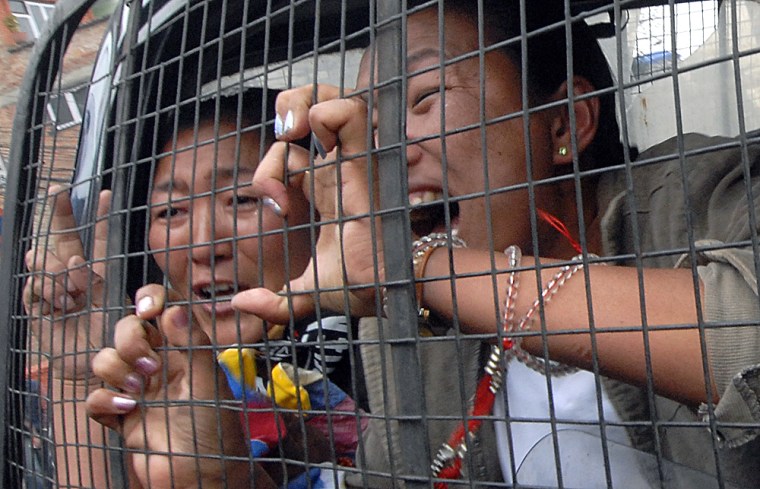Chinese state media said for the first time Thursday that Tibet protests have spread to other provinces.
The official Xinhua News Agency reported on "riots in Tibetan-inhabited areas in the provinces of Sichuan and Gansu, both neighboring Tibet."
It blamed both incidents on supporters of the Dalai Lama, Tibet's spiritual leader in exile.
Xinhua said late Wednesday that 170 people had surrendered for their role in last week's riots in Tibet's capital, Lhasa. China says 16 people were killed, denying Tibetan exile groups' claims that 80 died.
Police have clamped down in far-flung towns and villages seeking to restore control in Tibetan areas of western China as sporadic demonstrations against Chinese rule in Tibet flared up.
A top Beijing Olympics official vowed the unrest would not disrupt plans for the torch relay preceding this summer's Olympics in Beijing. One leg of the relay is to pass through Tibet, taking the flame to the peak of Mount Everest sometime in May.
Despite an expanding police crackdown, Tibetans have continued to take to the streets to call for Tibet's independence and the return of the Dalai Lama, their exiled spiritual leader.
'Free Tibet'
Hundreds of protesters, some on horseback and others on foot, stormed a government compound in the town of Hezuo in Gansu province Tuesday crying "Free Tibet.'' Whirling lassos and shaking fists, they burned the Chinese flag and hoisted the emblem of an independent Tibet.
The dramatic footage was captured by a Canadian television crew and aired by the British Broadcasting Corp.
The protesters were driven off by police wielding clubs and quickly dispersed after paramilitary reinforcements arrived. There were no reports of serious injures or arrests.
Police also quelled a small protest Tuesday in Lhasa, an employee of the local Coca-Cola bottler told The Associated Press.
In the Aba area of Sichuan province, people were ordered to stay inside after Tibetans poured into the streets Tuesday, a hotel receptionist said. She said she heard gunshots during the demonstration.
Protests to Chinese rule
Authorities appeared to be gradually regaining control in Tibet as well as the surrounding provinces where more than half of China's 5.4 million Tibetans live. Moving from town to town, police checked IDs and set up roadblocks to keep Tibetans in and reporters out.
Journalists in Gansu province saw towns that were like armed camps, with police lining the streets and few ordinary people venturing outdoors.
The protests have been the biggest challenge to Chinese rule in Tibet, a Himalayan region that the People's Liberation Army occupied in 1950 after several decades of effective independence.
Putting world attention on China's human rights record, the unrest has prompted discussion of a possible boycott of the Aug. 8 opening ceremony at the Beijing Olympics and calls for China to address Tibetans' grievances and engage in direct talks with the Dalai Lama.
A Chinese Olympic official said the violence would not interrupt plans to take the Olympic torch into Tibet and up Mount Everest.
"We know the incidents are the last thing we want to see, but we firmly believe that the government of the Tibet Autonomous Region will be able ensure the stability of Lhasa and Tibet, and also be able to ensure the smooth going of the torch relay in Tibet,'' Jiang Xiaoyu, executive vice president of the Beijing organizing committee, told reporters.
An athlete speaks out
Many Olympic committees have spoken out against a boycott of the games, but some athletes have voiced concern.
Michelle Engelsman of Australia, a swimming competitor at the Athens Olympics in 2004, told Australian Broadcasting Corp. television that the protests and crackdown had added to her concerns about possibly competing in Beijing.
"To be going into a country that has massive rioting and death going on, that's definitely something to be paying attention to and be concerned,'' she said.
'We ran for our lives'
Tourists who were evacuated to Nepal gave fresh accounts Wednesday of the chaos during Friday's protests.
Mark Robert Ward, an Australian who lives in India, recounted watching ethnic Tibetans stone Chinese merchants and hearing heavy weapons fire.
"We ventured down through the smoke and fire and rubble. We came across the military arresting four Tibetan woman. We were screamed at and hid behind a burning vehicle. Then they started shooting in our direction with live ammunition. We ran for our lives up,'' he said by telephone.
Ward said he saw at least one dead person being carried by Tibetans, describing a man in his 20s who had been shot at least three times.
'Don't commit violence'
China accuses the Dalai Lama of masterminding the protests from his base in the Indian town of Dharamsala, where he lives in exile.
The Nobel Peace laureate's government-in-exile called for an end to the violence in Tibetan regions on Tuesday, offering to step down as the head of Tibet's exiled state if that would stop the bloodshed.
“I say to China and the Tibetans — don’t commit violence,” he told reporters. He suggested the Chinese themselves may have had a hand in it to discredit him.
“It’s possible some Chinese agents are involved there,” he said. “Sometimes totalitarian regimes are very clever, so it is important to investigate.”
He said that “if things become out of control,” his “only option is to completely resign.”
Later, one of his top aides clarified the Dalai Lama’s comments.
“If the Tibetans were to choose the path of violence, he would have to resign because he is completely committed to nonviolence,” Tenzin Taklha said. “He would resign as the political leader and head of state, but not as the Dalai Lama. He will always be the Dalai Lama.”
China's official media called Dharamsala an "epicenter of lies," repeating Premier Wen's assertion that the unrest was "organized, premeditated, masterminded and incited by the Dalai clique."
